Book Reviews by Genre: Travel
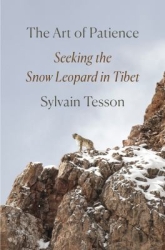
An engaging adventure story that celebrates reverence for nature, curiosity about the world, bold explorations into the wild, and a poetic narration that is both reflective and inspiring.
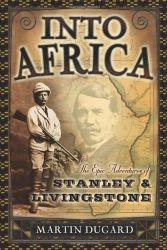
Into Africa, written by Martin Dugard, details the epic adventures of Stanley Livingstone and his trek across Africa to find the source of the Nile River. Livingstone battles disease, unfriendly tribes, and stubborn porters (the people who help carry supplies) in his journey. The brutal, but beautiful march encompasses Africa from it sweltering hot savannahs to it thick rainforests. I would recommend this book to anyone who likes adventure because this book is about the exploration of Africa. I enjoyed this book because it taught me a lot more about Africa and it's people.
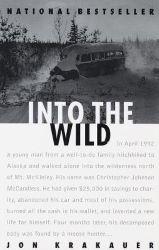
Jon Krakauer's "Into the Wild" might be the greatest nonfiction book I have read this year. I was assigned this book to read over my summer break for my English class. I am extremely grateful for this because it was very likely that I would not have discovered this masterpiece on my own. My favorite part about the book was the exact thing that Krakauer wared about in his forward; the author's similar personal experience. In a more general term, I savored every moment where Krakauer connected McCandless' story to other lesser-known examples in history, like John M. Waterman or Gene Rosellini. My least favorite part about the book wasn't explicitly in the book: the lack of definitive information outside of Into the Wild about McCandless makes me doubt some of the credibility of the information that Krakauer provided. Even if the factual information was true, I am still confronted with the author's admission that some of the details in the book were opinionated by Krakauer. The book was full of surprises. I will not spoil any, but the father's reaction when seeing "the scene" shocked me. I personally could not relate to any of the characters in this book. I lack the all-consuming drive to
reach a mostly independent state from society, and I have never fretted over a lost child. Regardless of my lack of a personal connection, this book was an extremely powerful book about those in society that wish to be outside society.
Reviewer Grade: 11
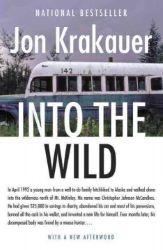
Into the Wild by Jon Krakauer is a nonfiction story about a young man named Cris McCandless. After graduating college in 1991, McCandless left without a trace hitchhiking around the United States. During his travels, McCandless goes by the name Alex Supertramp wanting to reinvent his life. He meets and changes countless people's lives. McCandless had his sights set religiously on Alaska, thinking it his last grand odyssey. McCandless wanted to fend for himself in the Alaskan wilderness, which inevitably proved fatal. This beautifully written book is full of adventure and life lessons. Overall, I would rate this book four out of five stars.

Over time, I've found Bill Bryson's books are hit-or-miss for me. I enjoyed his memoir about childhood, The Life and Times of the Thunderbolt Kid , and it was A Walk in the Woods: Rediscovering America on the Appalachian Trail that introduced me to Bryson in the first place. However, since then, I've struggled to find something that's lived up to those two books. At Home: A Short History of Private Life came close, but I was really turned off by I'm a Stranger Here Myself: Notes on Returning to America After Twenty Years Away. Ultimately, I hoped Neither Here Nor There would fit the bill, but it disappointed me once again.
Perhaps Bryson's travels in Europe weren't interesting to me because I haven't been over there myself. Most of the details in this book felt like they would only be understood by someone who knew what Bryson was talking about because they had experienced the same thing. I did appreciate the dueling retrospective look at Bryson's life between his younger days to when he was older and wiser, but most of the focus seemed to be on remembering when he was a young man (and all the negative foibles that come with it).
In the end, Neither Here Nor There doesn't really have anything to say. The author went to Europe and visited the same places twice. That's it. For those looking for some deep philosophical examination of Europe or a comparison of how it's better/worse when compared to the United States, you might end up being disappointed. Sure, there's some of that in here, but it's so light that it merely glances off the main plot of the literal traveling of Europe. It probably doesn't help that much of the humor in this book hasn't aged well either.
Bill Bryson's travel log from his trips to Europe, I give Neither Here Nor There 3.0 stars out of 5.
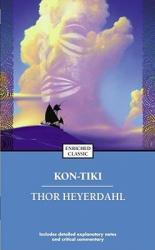
Kon-Tiki is a novel about a group of men who sail across the ocean on a polynesian raft with the bare necessities for life. Using barely any modern resources, like a GPS or Emergency SOS, they set sail in the early 1950’s. They wanted to prove that it is possible to sail to polynesia in a raft. The beginning was a little rough for me, as it was about the preparation, the, and the support behind the project. I disliked them going into so much detail about the raft they were trying to copy. They were trying to copy the exact rope, the exact bamboo, the exact position of launch, and the exact shape. If you are a story lover like me, it starts out rough, but it turns into a fabulous journey towards the middle. I enjoyed this book because of the sense of adventure and the sense of
exploration. It describes the adventure of meeting the Whale Shark with a passionate sense of adventure, describing the people on board being panicked at first, then treating it as a kind of puppy. This is a favorite of mine, due to the fact that the adventure was both interesting and thrilling. I recommend this book to anyone that is looking for an adventure on the sea.
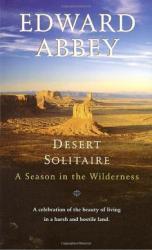
Desert Solitaire, written by Edward Abbey, is essentially a memoir of his time spent as a ranger outside of Moab, Utah, in the Arches National Park. It includes compelling commentary on the progression of industrial tourism, as well as life changing events and exciting stories. For some, the book may be a frustrating read, either because it lacks a linear plot, as a collection of journal entries and secondary memoirs, or because Abbey’s views are reminiscent of traditions from the 1930s. Abbey is aware of this, and begins the book with a series of disclaimers. For readers who enjoy beautiful writing about life in the West, Desert Solitaire should be a potential read.
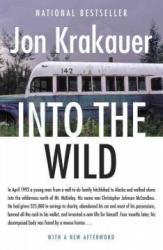
Into the Wild, by Jon Krakauer, is a novel that tells the true story of Chris McCandless, a restless adventurer whose happy place was in nature. McCandless graduated college and departed shortly after on a series of adventures, his main one being Alaska. Along the way, Chris met people, many of whom were moved by his go getter free spirited personality. Into the Wild is a phenomenally written novel that I'd recommend to anyone who's trying to search for purpose in their life. It's a book that displays a young man searching for his place in the world.
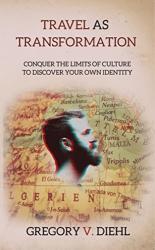
Part travel, part philosophy, part self help, this book is certainly a compelling read. Gregory Diehl shares his unique perspective and riveting accounts from his time spent traveling around the world. He describes in depth how his experiences and sometimes dark and uncomfortable lessons he learned while living in multiple countries around the globe have shaped his unique identity. He also challenges readers to examine the lessons in self discovery they too have encountered when traveling and to experience immersion in other cultures in order to develop a more well-rounded identity and life experience.
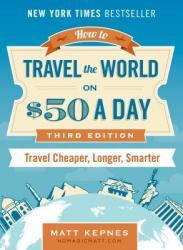
This book is jam-packed with helpful tips and tricks for making travel affordable and more accessible to individuals living on a budget. Whether you travel seldom or regularly, this book will get you excited about the various ways to save big money on trips that may have previously seemed financially out of reach. Want to plan a trip to India? Skip to the chapter specific to the country or region where you want to go for highly specified money-saving advice. I found myself jotting down a long list of notes to refer back to when planning for my next trip. Give it a read if you enjoy traveling and saving money while you do it!
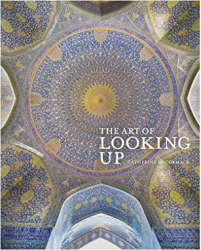
This book is about famous and not so famous ceiling art around the world and it has beautiful pictures and some awesome explanations about how the art lands into one of four categories: Politics, Religion, Culture, and Power. It is a really great book!!!
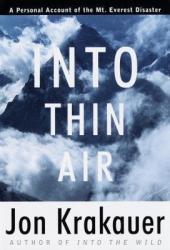
Into Thin Air is a narrative story of the author and climber, Jon Krakauer.
He establishes that ever since he was a kid, climbing Mt. Everest was his dream. He later accomplishes his ambition down the line, but with more consequences than anything rewarding.
Into Thin Air uses a consistent tone of language to identify whether the situation represents relief or tension. This gathers more intensity for those who are interested in thrillers and adventurous stories. The narrative offers a variety of twists and turns throughout the plot in order to continue the use of curiosity and unpredictability of the end. The story is very interesting, and builds upon every single detail, from the start until the end of the book.
Reviewer Grade: 11
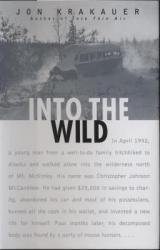
Into the Wild is a nonfiction narrative of the life of Christopher McCandless, a man who ventured into the wilderness of Alaska to live a self-sustained life. At first, I thought this book was awfully dry, but I soon warmed up to Krakauer's writing style. In fact, Into the Wild ended up being so thrilling and intriguing that I couldn't put it down. The best part of this book is the inspiration it provides. It talks about McCandless's reasons for leaving civilization behind, and it also mentions many transcendentalist authors. I now love nonfiction adventure. Everyone should read this book.
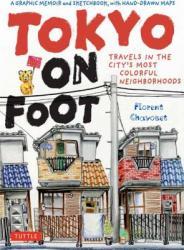
I read this book twice! I made a one-month trip to Japan, and this book had come up when I was looking for guidebooks about Tokyo. Once I started reading, I could read through it in several hours. The author is from France and lived in Tokyo for half a year. He describes what he experienced in colorful illustrations with animated characters. His observations were very keen in details, and location spots marked by the major train routes and police stations will let you know that Tokyo would be a fun and safe (and curious) place to visit. After my trip I checked it out again to assimilate my experiences. It was great to review my memories there. Thank you, author!
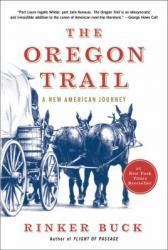
Have you ever daydreamed about what it was like to cross the American West in a covered wagon during the 1800s? Well, I have, and apparently Mr. Buck and his brother Nick have too. The idea to "See America Slowly" was planted by their father, who took them on a covered wagon trip from New Jersey to Pennsylvania which ended up being featured in LOOK magazine in 1958. Before setting out on their epic journey, Buck gives the reader fascinating background on wagons (it's not a Conestoga!), mules and their unsung contribution to America's development, and getting cheated (just like the early pioneers) by outfitters who sell inappropriate equipment at outrageous prices. The cast is filled out by three mules - Jake, Beck and Bute - and a filthy Jack Russell terrier named Olive Oyl. Along the way, our merry band will experience many of the hardships encountered by travelers in the nineteenth century (storms, lack of water, and dangerous terrain) and some new ones (semi trucks, miles of fences, and inferior truck stop coffee). Buck also gives the reader lively background sketches of the many colorful characters who made their way over the trail originally and the contemporary controversy over the LDS church's efforts to re-brand the route as the Mormon Trail. So hop aboard, partner, and let's go "see the elephant! You'll have a great trip.
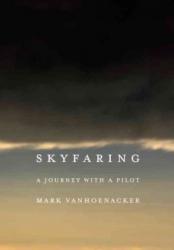
This book was one of the best books I have read this year. I
would strongly recommend this book to anyone who would be interested in working in the travel or airline industry. This book really does make you see how it is like to fly a plane through the eyes of a pilot. The author explains it almost poetically and nicely splits the book into nine chapters that all compare flying to the name of the chapter. These chapters are: Lift, Place, Wayfinding, Machine, Air, Water, Encounters, Night, and Return. You will really realize that flying is an almost completely different experience for the pilot than it is for the passenger. For example, he points out that as a passenger, you spend the entire flight looking out a small window in the side of the plane but as the pilots, you get a different experience as you are looking out the front and have a better view of the earth. All in all, I thought that this was one of the best books I have read this year and I am sure you would enjoy it too.
Reviewer Grade: 7
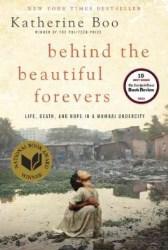
Actual Rating: 4.3
I originally discovered this book on a list of titles recommended by John Green, author of The Fault in Our Stars and Looking for Alaska. Katherine Boo’s incredible work revolves around “life, death, and hope in a Mumbai under city.” It follows several characters as they struggle to survive life in rural India: Abdul, a Muslim teenager who provides an income to his large family through collecting and selling trash, Asha, a woman with dreams of escaping poverty through politics, Kalu, a scrap metal thief, and dozens of others who live together in a small village built near the Mumbai airport. While this book may not be as relateable as many that are popular now, it brings humanity to a group of people we tend to see as “other” due to their distance and situation. This book changed the way I look at people below the poverty line, and I highly recommend it.
Reviewer Grade: 9
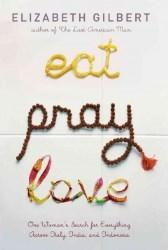
Elizabeth Gilbert has everything a normal person wants: loving husband, country home, a great career, and much more. But for some reason she was not happy, instead she felt confused and lost in her own world of thoughts. So, through a painful process, she leaves behind everything (her marriage, job, home) and plans a year round trip to Italy, India, and Indonesia, hoping that traveling to these places will help her find herself. I began reading this book this year for a school assignment and I have to say I didn’t like it from the cover and the first few pages. What made it interesting was that Eat, Pray, Love is an auto-biography by Elizabeth herself about her journey for self-actualization and also that you are able to learn a little bit more about the culture of these countries. I recommend this book to those who are having trouble about knowing who they are in the world, but while I was able to be intrigued by the book and it did grab my attention, let’s just say it didn’t have me standing on the edge of my seat and isn’t one of the best books I’ve read this year.
Reviewer Grade: 10
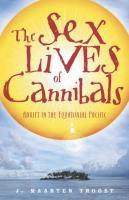
This one was pretty fun. A white guy's experience living in the Southern Pacific on a incredibly remote island called Kiribati. Definitely had some humorous moments. The most I got out of it though was that I had never heard of Kiribati and that I should do more research on it.